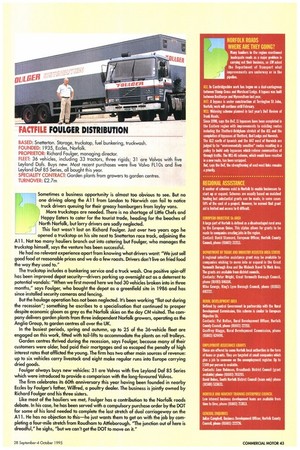BASED: Snetterton. Storage, truckstop, fuel bunkering, truckwash. FOUNDED: 1935, Eccles,
Page 45

If you've noticed an error in this article please click here to report it so we can fix it.
Norfolk, PROPRIETOR: Richard Foulger, managing director. FLEET: 36 vehicles, including 33 tractors, three rigids; 31 are Volvos with five Leyland Dafs. Buys new. Most recent purchases were five Volvo FL1Os and five Leyland Daf 85 Series, all bought this year.
SPECIALITY CONTRACT: Garden plants from growers to garden centres.
TURNOVER: £2.7m
Sometimes a business opportunity is almost too obvious to see. But no one driving along the All from London to Norwich can fail to notice truck drivers queuing for their greasy hamburgers from layby vans. More truckstops are needed. There is no shortage of Little Chefs and Happy Eaters to cater for the tourist trade, heading for the beaches of North Norfolk, but lorry drivers are sadly neglected.
This fact wasn't lost on Richard Foulger. Just over two years ago he opened a truckstop on his site next to Snetterton race track, adjoining the All. Not too many hauliers branch out into catering but Foulger, who manages the truckstop himself, says the venture has been successful.
He had no relevant experience apart from knowing what drivers want: "We just sell good food at reasonable prices and we do a few roasts. Drivers don't live on fried food the way they used to."
The truckstop includes a bunkering service and a truck wash. One positive spin-off has been improved depot security—drivers parking up overnight act as a deterrent to potential vandals: "When we first moved here we had 30 vehicles broken into in three months," says Foulger, who bought the depot as a greenfield site in 1986 and has since installed security cameras and fencing.
But the haulage operation has not been neglected. It's been working "flat out during the recession"; something he ascribes to a specialisation that continued to prosper despite economic gloom as grey as the Norfolk skies on the day CM visited. The cornpony delivers garden plants from three independent Norfolk growers, operating as the Anglia Group, to garden centres all over the UK.
In the busiest periods, spring and autumn, up to 25 of the 36-vehicle fleet are engaged on this work, fitted with tail-lifts to accommodate the plants on roll trolleys.
Garden centres thrived during the recession, says Foulger, because many of their customers were older, had paid their mortgages and so escaped the penalty of high interest rates that afflicted the young. The firm has two other main sources of revenue: up to six vehicles carry livestock and eight make regular runs into Europe carrying dried goods.
Foulger always buys new vehicles: 31 are Volvos with five Leyland Dal 85 Series which were introduced to provide a comparison with the long-favoured Volvos.
The firm celebrates its 60th anniversary this year having been founded in nearby Eccles by Foulger's father, Wilfred, a poultry dealer. The business is jointly owned by Richard Foulger and his three sisters.
Like most of the hauliers we met, Foulger has a contribution to the Norfolk roads debate. In his case, he has been served with a compulsory purchase order by the DOT for some of his land needed to complete the last stretch of dual carriageway on the Al 1. He has no objection to this—he just wants them to get on with the job by completing a four-mile stretch from Roudham to Attleborough. "The junction out of here is dreadful," he sighs, "but we can't get the DOT to move on it."




































































































































